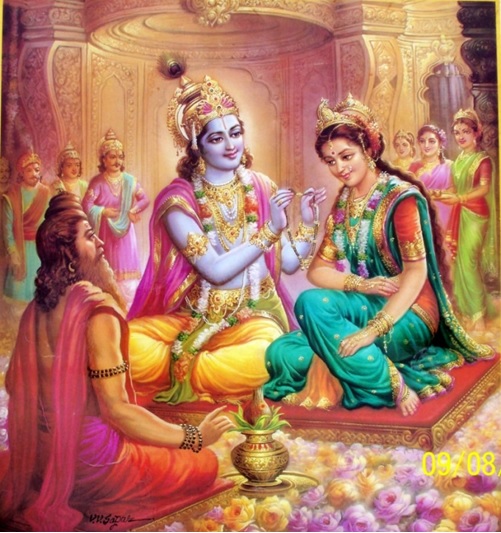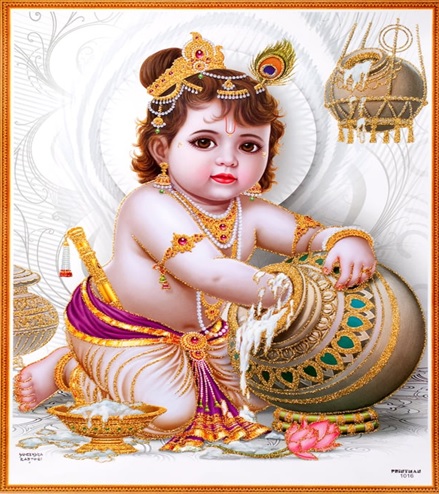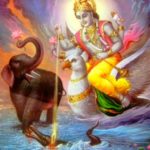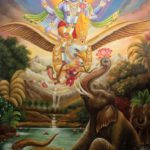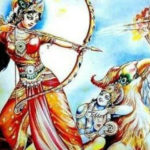Continuing our Series of Articles on the translation of Telugu Bhagavatam by Professor T.S.B. Narasaraju of Banaras Hindu University, is Excerpt III. Those interested in reading Excerpt I of our series can find it here and can read Excerpt II here.
This installment will provide selections from both Part I and Part II of Potana’s Bhagavata Purana (Dasama Skandha). This Post will give key episodes demonstrating the importance of Bhagavata Purana and why it is such a pillar of our culture.
Publishers interested in printing or offering e-Publication of Narasaraju garu’s work can reach him via email at shamraan@gmail.com
Click here to download Part I of the English Translation of Potana’s Bhagavata Purana (Dasama Skandha)
Click here to download Part II of the English Translation of Potana’s Bhagavata Purana (Dasama Skandha)
Part I Excerpt
3. Brahma and Maheswara Praising Vishnu as Infant in Devaki`s Womb
“Oh! Lord! You uphold truth as a ritual. You are the basis for attaining the Yogic state of permanency. You are a Kalatita being capable of existing in the past, present and future. The five Bhutas, earth,water, fire, air and sky are born in you and, in turn, you are present in all of them.You continue to exist even when all the five Bhutas are destroyed. Words spoken by you constitute an embodiment of truth. You maintain a sense of equality towards all that exists in this universe. We bow down before you.
Maya, which makes the unreal appear as real and makes the real look unreal, is under your control. Those under the influence of Maya with power of discrimination covered by it, see plurality mistakenly in you. Those who transcend the power of Maya are the enlightened and see you as a single existing entity in the entire gamut of apparent plurality of the universe (89).
You are the lord for all the living beings. In your creation there is what is known as a family, Samsara, which is comparable to a tree. The medium or milieu in which the family exists is the material world, Prakriti, which is comparable to a creeper entwining the tree. Happiness and sorrow are the two fruits to the tree. The three qualities, virtuosity (Sattvaguna), ambition (Rajoguna) and laziness (Tamoguna) which embrace a human being are the roots of the tree.The four objectives of human existence, namely, righteousness (Dharma), wealth (Ardha), desire (Kama) and salvation (Moksha) are the fluids (Rasas) flowing through the tree. What are experienced by the sense-organs, namely, sound (Sabda), touch (Sparsa), form (Rupa), taste (Ruchi) and smell (Vasana) are the receptive mechanisms of the tree. States of the human body such as, lust, anger, miserliness, love, pride, jealousy, hunger, thirst, sorrow, attachment, childhood, youth, old age , disease and death, among others, are all supporting parts of the tree. The principal constituents of the human body, such as, body fluids, blood, flesh, brain-matter, skeletal system and semen are the sheaths enclosing the trunk of the tree. The Pancha Bhutas mentioned above along with intelligence, consciousness and ego are the branches of the tree. The nine holes of the tree are eyes, ears, two nostrils, mouth and the two excretory organs. The five principal constituents of life, namely, Prana, Apana, Vyana, Udana and Samana along with the five subsidiary constituents of life, namely, Naga, Kurma, Krukara, Devadatta and Dhananjaya are the leaves of the tree. Human being (Jeeva) and the lord (Iswara) are comparable to two birds residing on the tree. Oh! Lord! You are the creator, protector and destroyer of such an extra-ordinary family tree (90, 91).
The enlightened persons keep their minds focussed on you preventing them from deviation. They thus cross the dreadful ocean, namely, family ( Bhavasagara) effortlessly (92).You take any number of births to do good to the good and to punish the bad thereby keeping the worlds safe (93). Oh! Lord with eyes as beautiful as lotuses! The enlightened get salvation by uttering your name with devotion. Some pretend to be enlightened with destructive intelligence and refuse to utter your name not learning a lesson from those who had a down-fall due to such a behaviour (94). Great devotees keep their thoughts focussed on you. This enables them to become your men, being fearless and devoid of obstacles in life. They reside in the divine place where you stay (95).You are worshipped by human beings belonging to the four principal classifications, namely, the unmarried, those with families, the old detached from their families and the ascetics. In all the worlds (Lokas) you wear a virtuous, and sacred body ensuring the safety of your devotees (96).
Oh! Lord with eyes comparable to lotuses! Your body is an embodiment of virtues and knowledge eliminating ignorance. You are considered as an effulgent embodiment of virtuosity. A devotee who worships you keeping such a form of yours in his mind is blessed with your appearance before him. You remain as an observer following a path which transcends the different forms of behaviour, mind and speech. Only the enlightened can perceive your form which is beyond Gunas (mental states) and Kriyas (actions). Remaining engrossed in your worship, thinking and hearing only about you and praising you incessantly, your devotees are able to strap the terrestrial bonds of the family and stay at your feet eternally (97).
Oh! Lord! You are the best among all. You are the ruler for all of us. Your birth is to lessen the burden of the earth. With your grace and under the shelter of your feet, as attractive as lotuses, we are able to discern our existence in a mileu surrounded by the earth and the sky (98). Oh! Lord! You are devoid of birth. Hence, taking birth now as Devaki`s son is a playful event for you. While birth and death are the acts of Maya inflicted on the human beings, Maya staying in your proximity runs away incapable of touching you. You are therefore the only one capable of not getting entangled in the acts of Maya and hence you are the lord of the universe (99).
You took several births in different forms (Avataras) with qualities of grace and kindness and condescended to save the world in crisis. You were born as a great fish (Matsya), a tortoise (Kurma), a pig (Varaha), a combined form of man and lion (Narasimha), a short man (Vamana), a horse-faced human form (Hayagriva), Parasurama and Rama. We salute to you for this act of kindness. We pray to you to save the earth by reducing its load (100).The world is drowned in incessant sorrow being tormented cruelly by vicious people like Kamsa. Lord Mukunda!You leave Devaki`s womb and take birth soon(101).”Addressing Devaki, lord Brahma and the Devatas accompanying him said, “Mother! Lord Purushottama is in your womb. He is likely to take birth soon. There is no more fear from Kamsa.You please have faith in our words. Today onwards your safety is assured. All the Yadavas are excited with joy. May your progeny prosper always (102,103)!After praising Lord Vishnu as described above, the Devatas being led by lords Brahma and Maheswara blessed Devaki and departed (104).
Part II Excerpt
34.Krishna Going to City of Kundina on his Chariot
The best among Yadavas, Krishna heard patiently the narration by the Brahmin of the message of the daughter of king of Vidarbha, her form, beauty and other important aspects. He held in his hand smiling the hand of the Brahmin and uttered the following words :- “ Oh! Recepient of approbation of the learned! I have an intense desire to marry Rukmini. Hence I have been spending sleepless nights. I know even earlier that Rukmi had bad intentions disapproving this marriage.I crush the enemy groups and get Rukmini, a jewel among maidens. It is like generating fire from rubbing wood (1716). I reach the kingdom of Vidarbha and enter the city of Kundina effortlessly. I get the maiden in a flash. In case the enemies oppose me I kill them in the battle-field (1717).”
Having said those words, Hari came to know about the stipulated time of proposed marriage of Rukmini Devi. In accordance with orders of the lord, his charioteer Daraka, got ready a chariot with four horses by names Saibya, Sugriva, Meghapushpa and Valahaka respectively. Hari got up the chariot along with the Brahmin, crossed all the intermediary kingdoms in one night and reached the kingdom of Vidarbha. There, Bhishmaka, the king of Kundina, agreed to get his daughter married to Sisupala under the compulsion of his son and started getting the preparations done for the event (1718).
The whole city was decorated. Porticos, lanes, royal-paths and marketing places were all cleaned. Water mixed with sandal paste was sprinkled every-where. Enchanting festoons of lotuses were erected. All the houses were cleaned and designs of Karpoora and Kumkuma were drawn in front of the houses to the accompaniment of fragrant smoke from sticks of Agar.Men and women every-where wore new multi-coloured garments. They decorated themselves with different types of flower-garlands, jewellery and fragrant skin-lotions, scents and ointments.The whole city wore a festive appearance (1719).
Bhishmaka paid obeisance to his ancestors following the stipulated procedures, fed the Brahmins and got auspicious blessings recited by them. Rukmini Devi was made to have a special auspicious bath. He got her decorated with special robes and ornaments studded with precious stones. Brahmins recited from Rig, Yajur, Sama and Adharvana Vedas to shower ceremonial blessings on the bride for her protection and safety. A Purohit got obeisance to god Agni done through performance of stipulated Homa for peace at the place of residence. In addition, the king donated seeds of til and wheat, silver, gold and clothes to Brahmins for the good of the couple getting married (1720).
In the mean-while the king of Chedi reached the city of Kundina with pomp, feeling proud of getting married to the princess of the kingdom of Vidarbha. He was accompanied by a retinue of soldiers, a row of chariots, a collection of elephants of a fine quality, a group of quick-running horses, relations and friends (1721). Jarasandha, Dantavaktra, Salva, Viduraka, Poundrakavasudeva and others came along with arrogant-looking elephants, infantry, horses and chariots professing that Balarama, Krishna and their relations would be driven out to get the princess married to Sisupala without any opposition (1722). In addition kings of several other kingdoms arrived. Bhishmaka went in advance to welcome Sisupala and made arrangement for appropriate accommodation for him.
Balarama came to know about the entire information (1723). He thought within himself as follows :- “ Hari went alone. Many well-wishers of the king of Chedi such as Jarasandha and others went to the city of Kundina to help him. There is bound to be a war at the place of getting the maiden. My brother needs help.” Carrying his weapon he went along the path followed by Krishna. He was accompanied by a huge army (1724). In the mean-while the drooping-broad-eyed Rukmini was sitting solitary inside a temple. She was getting agitated fearing that Krishna, an eye to all the Lokas, might not reach her after seeing her message (1725).
Rukmini thought as follows within herself :- “ Tomorrow is the day of the proposed marriage. The event ia approaching closer. How is it that Govinda has not come yet? My mind is getting agitated. I do not know whether the lord got the message or not. Why did the Brahmin Agnidyotana delay so much? Is my attempt going to be successful or is it to get wasted? What is ordained by the Almighty is not known (1726). Did that illustrious Brahmin reach Dwaraka? Did he get tired on the way giving up the plan? Did Krishna consider my message to be improper after listening to it? Alternatively did he already reach this place? Does the proposal get god`s favour or not? Does Aryamahadevi save me or not? I do not know as to what is destined for me (1727).”
She continued to think within herself as follows :- “ Agnidyotana might not have gone to Dwaraka. That is why the son of Vasudeva did not come to this place. There is no intimate relation to go to invite Hari to come to this place. Alas! My brother lost all decency in getting ready to offer me to the resident of Chedi. Alas! Goddess Gauri does not have kindness for me today (1728,1729).”
She was not inclined to narrate to her mother the agitation in her mind. She was not in a mood to spread in all directions the brightness of her sweet smile. She was disinterested in driving away the carpenter-beetles hovering round being attracted by her lotus-like countenance. She was avoiding sleep. She was disinclined to untwine the coiled pearl-necklaces of her bosom. There was no attempt to turn her eyes away even for a second from the path to be followed by Krishna to reach her (1730).
She did not wipe tears flowing from her eyes nor did she put in order her tuft of hair hanging behind on her neck. She stopped exchanging pleasantries with her companions. Her food-intake became meager. She refused even to touch drinking-water. She stopped teaching recitation of poems to the friendly parrot approaching her. She had no inclination to stretch the strings of Veena to cause entertainment. She had no desire to go to her friends (1731).
Vanamali, Krishna did not come to take her away in response to her prayers. It was unjust on his part. Consequently, Mrigaraja-madhyama, the thin-waisted Rukmini refused to apply Mriganabhi, fragrant musk lotion to her body. Having a face resembling a mirror, she refused to look into a mirror for her beautification. Being a Puvvuboni, a beautiful maiden, she gave up wearing Puvvulu, flowers.Having eyes resembling Jalajas, lotuses, she relinquished Jalakrida, aquatic games. Being a Vanajata-lochana, one having eyes similar to lotuses, she became disinterested in Vanakeli, forest-sports. Having a gait similar to Hamsa, a swan she became disinclined to rear a swan. Having a body as tender as a creeper, Latika-lalita-deha, she was reluctant to bring up creepers, Latas. Being herself an ornament to ornaments, she refused to wear ornaments. Being a Tilakini-tilakmu, the best among women, she gave up putting Tilaka, a saffron mark on fore-head as a decoration. Having hands like lotuses, Kamala-hasta, she was reluctant to enter a house of lotuses, Kamal-griha (1732).
In addition, a strong desire for Krishna inflicted heat on Rukmini and made her behave abnormally. She resisted a gentle breeze. She avoided the noisy cluster of carpenter-beetles. She was angry with the cries of cuckoo. She was agitated by the sweet words of young parrots. She felt moon-light to be warm and avoided the shade of young mango trees (1733,1734). Thus she was under the sway of Manmadha. In the process of awaiting Krishna`s arrival she was unmindful of even her routine acts of the day.
Indicating a favourable omen, her left eye and left shoulder started tingling. Agnidyotana came to her quickly in accordance with the orders of Achuta. She noticed the facial expressions of him. The sweet-voiced Rukmini went quickly and extremely eagerly towards him with a smile on her face.The Brahmin said, “ Oh! Maiden! The lord with Sudarsana as his weapon praised your sterling qualities. He gave limitless wealth to me. He already reached this place. He is sure to take you away under Rakshasvivaha even if Devatas and Danavas oppose him. Your good behaviour and good fortune are coming to fruition today (1736).” Hearing those words the princess of Vidarbha said, “ Oh! Gem of the Brahmin race! Donor of boons desired by relations! Conveying my message, you brought along with you the lord himself with eyes comparable to lotus petals. You kept me alive. I am surviving solely by your grace. There is no other virtuous man like you. I am ignorant about the way I have to reciprocate the help done. Oh! The best among Brahmins! I pay my obeisance to you with folded hands (1737,1738).” Thus she prayed to the Brahmin.
King Bhishmaka came to know that Balarama and Krishna came to attend the marriage of his daughter. He went with the accompaniment of festive sounds from auspicious musical instruments, received them with full honours, presented them clothes and ornaments, among others. He got all arrangements made for stay and other conveniences for them, their relations and army accompanying them. Bhishmaka treated thus all the kings who visited the city of Kundina with honours appropriate to their age, power and status offering them what all they desired (1739).
The inhabitants of Vidarbha heard about the arrival of Hari, came to have his Darshan and felt ecstatic enjoying with their eyes the sight of his countenance comparable to a lotus. They said, “This lord, with Sudarsana as his weapon, is the most suited to the pricess of Vidarbha. The princess is also, in turn, equally suited to him. What an excellent alliance! How skilled is lord Brahma in making these two husband and wife! May Chakri, consequent upon our past virtuous deeds, become husband of this handsome girl through his valour (1740).”
During that time, maiden Rukmini, with locks of hair covering her fore-head, started for worshipping goddess Gauri by walking towards the out-skirts of the city accompanied by a procession. Brave soldiers fully equipped with diverse arms walked protecting her. Dancing girls walked in a group in front carrying eatables and presents. The wives of Brahmins, with sandal-paste applied to their bodies, followed her singing, having flowers in their tufts of hair and wearing new saris and ornaments. The sounds of various percussion and blowing instruments sky-rocketted. Companions, servant-maids and women related to her followed her (1741,1742).
Encomiasts, singers and others singing in praise accompanied her. Rukmini reached the temple of goddess Gauri walking gracefully like a swan. All the while she was praying mentally to the lotus-shaped feet of Mukunda. She cleansed her feet and hands, purified herself and reached the proximity of the deity. The wives of Brahmins sprinkled sacred water on the idols of lord Siva and goddess Bhavani. They offered sandal-paste and saffron-soaked rice to the deity. They decorated the idol of the goddess with new clothes, flower-garlands and ornaments. They offered, in addition, lighted Agarbattis and Deepas to the idol. Diverse types of eatables were offered to the goddess as Nyvedya. They gave presents to the deity and later made Rukmini pray to the goddess (1743).
Rukmini Devi prayed to goddess Gauri as follows :- “Oh! Mother Iswari! I have implicit faith in my mind on the eternal and primordial couple, Uma and Maheswara. I pray to you with devotion. You are the best among mothers. You are an ocean of grace. Make Hari my husband. There is never a misfortune to those who repose their faith in you (1744).” She presented to the Brahmin ladies and their husbands salt, special eatables, betel-leaves, Mangalasutras and stumps of cane-sugar plants and prayed to them (1745). The Brahmin ladies, in turn, blessed her enthusiastically and sprinkled Akshatas on her head. With those on her head, she prayed to the consort of lord Siva, gave up the silence she was following till then and left the temple (1746)
Such a Rukmini who came out was looking like a lightning in the midst of clouds during the commencement of rainy season, a deer coming out from the lunar surface and hovering around, walked slowly like a divine figure, Mohini manifesting from behind a curtain lifted by an actor,lord Brahma and goddess Rama-Ramani emerging from a whirl-pool with accompanying sounds in the middle of an ocean being churned by Suras and Asuras using mountain Mandara as a stirrer and serpent Vasuki as a rope fastening the stirrer.
Thus Rukmini started from Kali temple appearing lustrous in diverse forms. She was walking slowly like a young fabulous swan loitering amidst golden lotuses in Manasa-Sarovara. Her waist was losing balance under the load of her breasts comparable to golden narrow-necked vessels. She was holding the hand of her beloved companion with hers being reddened by the ruby-studded ring on her finger. The luster from her golden earrings studded with precious stones was dancing on her cheeks. Her curly locks of hair, comparable to carpenter-beetles hovering round fragrance of lotuses, were covering her pretty countenance. The light emerging from her pleasant smile was like fresh moon-light spreading in all directions.The red colour of her lips comparable to that of Donda-Pandu was lending red colour to her otherwise white teeth looking like buds of jasmine. The edge of her sari put on her shoulder was fluttering like the flag of Manmadha. Precious stones, studded in her golden belt wound over clothes around the waist,Oddanam were emanating a luster creating illusion of an untimely rain-bow. The hearts of valorous kings were made to flutter by her beautiful glances which could be compared to sharp arrows of Manmadha glittering after being just taken out from their receptacle. Her beautiful anklets were producing melodious sounds causing a feast to the ears. She was coming out walking in a valorous and captivating form awaiting the arrival of Hari (1747).
Seeing Rukmini all the on-lookers were astonished. She had locks of hair black as carpenter-beetles, a face comparable to a full-moon, glances like those of an antelope, lips like corals, an indescribably sweet tone, a pair of feet tender like fresh new leaves, breasts like heads of elephants, a lower back like a sandy island, a walk like that of a superior elephant, hands like red lotuses, a waist like that of a lion and a body-fragrance like that of a lotus (1748).The princes there had their minds attracted by her smile and glances full of shyness.They lost their steadiness and grandeur. They forgot about their status and became actionless and forgetful. They let their weapons slip down. They gave up getting up on their elephants, horses and chariots and slipped down to the ground. Rukmini with her glances like those of a deer was found pushing up her locks of hair hanging on her fore-head with nails of her left-hand and setting right her sari on her shoulder. In the process of performing these acts, she had her side-glances on the group of princes (1749).
During that time she saw Jaganmohana Krishna. He had a face like a full-moon, a waist like that of a lion, eyes like fresh lotuses, most handsome chest, a complexion like that of a blue cloud, hands like the trunk of elephant Ia weapon, Iravata, silken yellow coloured robes and Chakra as a weapon. He appeared to be anxious to become victorious and capable of getting attracted by the entire universe (1750).
Disclaimer: This book represents the opinions of Author, and should not be considered a reflection of the views of Andhra Cultural Portal. The author is responsible for ensuring the factual veracity of the content, herein.
Copyright: T.S.B.Narasaraju. All rights reserved. 2017.
